Our Archdiocese
- Archbishop
- Bishop
- Vicar General & Episcopal Vicars
- Statistical Overview
- Boundaries of Archdiocese
- Organisational Structure
- Archdiocesan Assembly 2023-24
- Archdiocesan Plan 2016 - 2021
- History
- Coat of Arms
- Fifth Plenary Council of Australia
- Cathedral
- COVID-19 Position Statement
- Modern Slavery Statement
- Connect With Us
- MOBILE APP

Pastoral Letter from
The Most Rev Timothy Costelloe SDB
Archbishop of Perth
To the Catholic People of the Archdiocese of Perth
Tuesday 16 August 2022
Download the full text in PDF
Dear sisters and brothers in Christ,
The Second Assembly of the Fifth Plenary Council of the Catholic Church in Australia, which took place in Sydney between Sunday, 3 July and Saturday, 9 July 2022, in one sense brings to an end the long journey of the Plenary Council. After four and a half years, during which so many Catholics engaged in prayer, reflection and discussion, this final assembly discerned some important directions for the Church in Australia as we move into an uncertain future. The results of the Plenary Council, which will now be referred to the Holy Father, Pope Francis, for his reflection and advice, can be found on the Plenary Council website.
Once the Pope has given his approval, the decisions of the Plenary Council will need to be implemented at the local level of each Australian diocese, including our own. In that sense the Plenary Council, although its formal sessions are completed, is only just beginning – for the Council will not be effective, and we will not have responded to the guidance of the Holy Spirit, until we bring the Council’s decisions alive in each local Catholic community and setting.
The Mystery of the Eucharist in the Life of the Church
During the course of the long years of preparation for the Plenary Council, one of the questions which has emerged is this: What does it mean for us to be a Christ-centred Church which is prayerful and Eucharistic? It is this question which I want to consider in this letter.
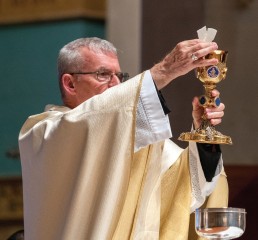 On the night He was betrayed, He Himself (Jesus) took bread, and giving you thanks, He said the blessing, broke the bread and gave it to his disciples, saying:
On the night He was betrayed, He Himself (Jesus) took bread, and giving you thanks, He said the blessing, broke the bread and gave it to his disciples, saying:
Take this, all of you, and eat of it, for this is my Body, which will be given up for you.
In a similar way, when supper was ended, He took the chalice, and, giving you thanks, He said the blessing, and gave the chalice to his disciples, saying:
Take this, all of you, and drink from it: for this is the chalice of my Blood, the Blood of the new and eternal covenant, which will be poured out for you and for many for the forgiveness of sins. Do this in memory of me.
These words of Institution come from the Third Eucharistic Prayer and find their origin in the accounts of the Institution of the Lord’s Supper in the New Testament. The very nature of the words makes clear the essential link between what Jesus said and did at this Last Supper with his disciples and what He said and did on the hill of Calvary the following day. The broken bread points towards the body of Jesus, broken on the Cross. The wine poured into the chalice points towards the blood of Jesus poured out in suffering and death on the Cross. Before Jesus physically gives his life for us on Good Friday, He does so sacramentally on Holy Thursday in the bread and wine of the Eucharist which become his body and blood for us. In answer to His command to do this in memory of me the Church has continued to celebrate the Eucharist, knowing that “as often as you eat this bread and drink this cup you proclaim the Lord’s death until He comes” (1 Cor 11:26).

One of the acclamations which we say immediately after the Consecration invites us to remember that the Eucharist is the sacrament of our salvation: Save us, Saviour of the world, for by your Cross and resurrection you have set us free. In celebrating the Eucharist, we are celebrating, and being drawn into, the great mystery of our salvation: God so loved the world that He gave his only Son, so that everyone who believes in Him may not perish but may have eternal life (John 3:16). This gift of eternal life is the fruit of the life, death and resurrection of Christ: the fruit of the paschal mystery in its fullest sense. But all of this celebration will only make sense to us if we recognise our need for salvation and acknowledge that, no matter how hard we try, we cannot save ourselves. This recognition will only come through an acknowledgement of the power of sin and evil at work in our lives. Such a recognition will require great honesty and courage from each one of us.
The giving of his Son to us by God the Father was a giving-unto-death, just as the self-giving by Jesus was a self-giving unto death. Nothing was held back. In this the great mystery of God’s love for us is revealed. In this, too, the great mystery of a fully human response to God’s love is also revealed. God holds nothing back and, in Jesus, humanity holds nothing back from God in return. In Jesus the perfect response of a human being to God’s love is realised and we see in Jesus what we are called to be and to do.
This response of Jesus which, of course, marked his whole life and came to its final and complete fulfilment in His death on the Cross, is also encompassed in his words to His disciples, among whom we are also numbered: do this in memory of me. In this way the Eucharist we celebrate becomes the Eucharist we live. The meaning of the Eucharistic celebration reveals the meaning of our lives. Just as Jesus gave his life for us, so we now are called to give our lives for Him and for all those He loves – which is everybody.
The living of our lives, our Eucharistic lives, in this most challenging of ways is made possible and sustained by the Eucharistic celebration. It is through the regular celebration of the Eucharist that we become, as individuals and as communities, the people God is calling us to be – people who can say with Saint Paul, “It is no longer I who live, but it is Christ who lives in me” (Gal 2:20). Paraphrasing the words of Saint Augustine, we can say that in celebrating the Eucharist and in receiving the Eucharist we become what we receive: the body of Christ (Saint Augustine, Sermon 272).
How right, then, were the bishops gathered in Rome for the Second Vatican Council from 1962 to 1965, to proclaim that the Eucharist is “the source and summit of the Christian life” (Lumen Gentium, No 11). Indeed, according to the Council, “the other sacraments, and indeed all ecclesiastical ministries and works of the apostolate are bound up with the Eucharist and are directed towards it. For in the most blessed Eucharist is contained the whole spiritual good of the Church, namely Christ himself, our Pasch and the living bread which gives life to people through his flesh” (Presbyterorum Ordinis, 5).
If it is true that the celebration of the Eucharist is at the very heart of the life of the Church and is the most precious gift of God to the Church, then it is impossible to conceive of the Church without the Eucharist. Equally, it is impossible to conceive of a truly faithful, and faith-filled, living of the Christian life for a Catholic apart from regular participation in the Eucharist.
The Sunday Obligation
This is, of course, one of the principle reasons for the long-standing tradition in Catholicism of insisting on “the Sunday Obligation”. You will be aware that, with the advent of the COVID-19 pandemic, I temporarily suspended this obligation in order to protect vulnerable people from this disease and to free them from any conscientious scruples they might have had in relation to this matter. I believe that the time has come to remind us all again of the centrality of the Eucharist and of our need for the Eucharist. For that reason, I am reinstating the Sunday obligation, effective from the first Sunday in September (Sunday, 4 September 2022).
In making this decision I want to stress two points. The first is that, because of the ongoing threat from COVID-19, coupled with the reality of a severe influenza season this year, legitimate concerns about either contracting the COVID-19 or flu virus from others, or spreading either virus to others, constitute a reasonable motive for deciding not to attend Mass on any given Sunday. No-one should feel guilty in making such decisions. On the contrary, such decisions are signs of a mature approach to our faith and a genuine concern for the common good of our society.

The second point is this. When I speak of the “Sunday obligation” I am speaking of an obligation born of love rather than of fear. While the Sunday obligation is certainly part of Church law, its aim is to support us in our efforts to keep daily before our minds a consciousness of the Lord’s love for us and call to us.
Parents, I think, are particularly well able to understand talk of “obligations of love”. The disinclination to do certain things, or to forego certain things, is very real, but the desire to respond to the needs of those we love, experienced so often by parents in relation to their children, can be an even more powerful motivating force. The willingness to make sacrifices for our children is a sign of our love for them. Conversely, the persistent failure to put the needs of our children above our own needs and desires may say something very different about us. Similarly, it is the obligation born of love for and gratitude towards God which grounds our need to gather together each weekend to celebrate Mass.
The Celebration of the Eucharist in the local Church
If there is an obligation born of love to gather each Saturday evening or Sunday to celebrate the Eucharist, there is another obligation, also born of love, which falls primarily on the clergy and on those who cooperate with them to animate the liturgy in the local parish.
The gift of the Eucharist, like the gift of faith itself, comes to us from God who calls us into His Church through baptism and nourishes and strengthens this faith through our life within the Church. That God should choose us will always remain both an undeserved grace and a profound mystery. Our individual and communal stories of reluctance to respond to God’s call only deepen the mystery. Surely, we might think, God could have chosen those who were more likely to live faithfully the gift of faith they had been given. But the stark, and beautiful, reality is that in God’s strange ways it is we who have been called and it is we from whom God is patiently awaiting a response.
Because our faith, and the Church, and the sacraments of the Church, are gifts which come from God we, for our part, are called to receive these gifts with reverence, with gratitude and with enthusiasm, and to use them well. We are also called to cherish these gifts and to respect and preserve them, for they are both beautiful and fragile, and can easily be damaged. It is for this reason that the Church entrusts both its faith and its liturgy, not exclusively, but certainly in a special way, to the oversight and care of the local Bishop. In relation to the liturgical life of the Church we are told, in the rather technical language of Canon Law, that “the supervision of the sacred liturgy depends solely on the authority of the Church which resides in the Apostolic See and, in accord with the law, the diocesan bishop” (Canon 383, §1).
Fidelity to the Church’s requirements
There is a simple reason for this provision of Church law: the liturgy gives concrete expression to the faith of the Church. Because of this the manner of celebrating the liturgy should never be subject to the personal whims of the celebrant, or the particular preferences of a local parish Liturgy Committee, with only limited reference to the requirements set out by the Church in its official documents. Otherwise it could easily happen that it is the idiosyncratic faith of a particular person or group, rather than the faith of the Church, which is being celebrated and promoted. In relation to the Eucharist in particular, this would be a betrayal of the Lord himself who told us to “do this in memory of me”.
Pope Francis recently alluded to this in a document, Traditionis Custodes, which he published last year concerning the use of what Pope Benedict XVI had called the “Extraordinary Form of the Roman Rite”.2 Pope Francis expanded on this in an accompanying letter addressed to the bishops of the world, and he has reiterated it on a number of subsequent occasions.
In the course of his letter the pope wrote as follows:
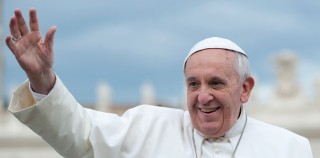 I am saddened by abuses in the celebration of the liturgy on all sides. In common with Benedict XVI, I deplore the fact that “in many places the prescriptions of the new Missal are not observed in celebration, but indeed come to be interpreted as an authorization for or even a requirement of creativity, which leads to almost unbearable distortions”.
I am saddened by abuses in the celebration of the liturgy on all sides. In common with Benedict XVI, I deplore the fact that “in many places the prescriptions of the new Missal are not observed in celebration, but indeed come to be interpreted as an authorization for or even a requirement of creativity, which leads to almost unbearable distortions”.
A little later in the letter Pope Francis presented the bishops with the following challenge:
I ask you to be vigilant in ensuring that every liturgy be celebrated with decorum and fidelity to the liturgical books promulgated after Vatican Council II, without the eccentricities that can easily degenerate into abuses. Seminarians and new priests should be formed in the faithful observance of the prescriptions of the Missal and liturgical books, in which is reflected the liturgical reform willed by Vatican Council II.
These two paragraphs from the Pope’s letter to the bishops invite every bishop, every priest and every Catholic to undertake an “examination of conscience” in relation to the way the Church’s liturgy, and in particular the Eucharist, is celebrated in our archdiocese, in our local parish, in our schools and in any other Catholic community which gathers to celebrate the Mass.
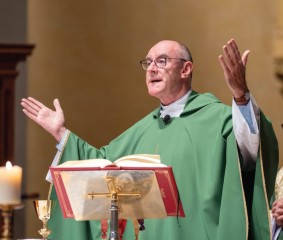 With this in mind, I have asked Fr Vincent Glynn, the Episcopal Vicar for Education and Faith Formation, to work with various agencies and groups in the archdiocese to develop a process whereby all of us in the diocese might engage in a renewal of our liturgical practice, by engaging in a deeper study and reflection on the faith of the Church which is expressed in the Church’s liturgy. In entrusting this to Fr Glynn I have asked that at the heart of this programme of renewal there should be a rediscovery of the richness of our Catholic faith in the Eucharist, including our belief in the real presence of Jesus Christ under the sacramental signs of bread and wine.
With this in mind, I have asked Fr Vincent Glynn, the Episcopal Vicar for Education and Faith Formation, to work with various agencies and groups in the archdiocese to develop a process whereby all of us in the diocese might engage in a renewal of our liturgical practice, by engaging in a deeper study and reflection on the faith of the Church which is expressed in the Church’s liturgy. In entrusting this to Fr Glynn I have asked that at the heart of this programme of renewal there should be a rediscovery of the richness of our Catholic faith in the Eucharist, including our belief in the real presence of Jesus Christ under the sacramental signs of bread and wine.
In this way I hope to help us all to answer one of the key questions which arose in the long journey of discernment for the Plenary Council: What does it mean to be a Christ-centred Church which is prayerful and Eucharistic?
The Eucharist, the Sacrament of Unity
 The very earliest theology of the Eucharist, found in the writings of Saint Paul, stresses the theme of communion and unity.
The very earliest theology of the Eucharist, found in the writings of Saint Paul, stresses the theme of communion and unity.
The cup of blessing that we bless, is it not a sharing in the blood of Christ? The bread that we break, is it not a sharing in the body of Christ? Because there is one bread, we who are many are one body, for we all partake of the one bread (1 Cor 10:16-17).
It should not surprise us that Saint Paul links the Eucharistic body of Christ to the Body of Christ which is the Church. As Catholics we have a very incarnational theology, a theology which is grounded in the visible and in the tangible. We have always believed that the Lord’s Church is so much more than an institution like so many other institutions around which our society is structured. In Catholic theology the institutional reality of the Church gives concrete expression to the deeper reality of the Church as the ongoing presence of Christ present and active in the world. We are, indeed, the Body of Christ, as Saint Paul so often insists, and Christ is the head of his body and the source of life in the Church through the enduring gift of His Holy Spirit.
This explains the importance the Church gives to the theme of unity. It is one of the four characteristics of the Church which we proclaim every time we recite the Nicene Creed: I believe in one, holy, catholic and apostolic Church.
Unity, of course, is not the same as uniformity. Saint Paul uses the image of the body to make this clear. “Just as the body is one and has many members,” he writes, “and all the members of the body, though many, are one body, so it is with Christ” (1 Cor 12:12). Paul then goes on to speak of the many ways in which the Spirit distributes gifts to God’s people. This theme is also developed in the Letter to the Ephesians where Paul indicates clearly that all these gifts, in their great variety, are given “for building up the body of Christ until all of us come to the unity of the faith…” (Eph 4:11-13).
Within the Body of Christ, and as a ministry of service, the Lord has entrusted the oversight of the life and mission of the Church to the bishops. They are the successors of the apostles, who in communion with the Pope (“with Peter and under Peter”), have the responsibility of safeguarding the unity and communion of the Church, always without stifling that legitimate diversity which is the work of the Holy Spirit within the Church.
Traditionis Custodes – the Regulation of the Celebration of the Mass according to the pre-Vatican II Rites.
The essential link between the unity of the Church and the celebration of the Sacraments, and in a very special way the Eucharist, thus becomes clear. If we are, as Saint Augustine suggests, called to become what we celebrate, then the Eucharist must be the greatest and clearest sign and effective instrument of the unity we share as brothers and sisters in the one community of faith. It is this conviction, and Pope Francis’s understanding of the fundamental role of the bishop as the overseer and promoter of the Church’s unity, which has led the pope to revise some of the conditions which, under Pope Benedict, regulated the practice of celebrating the Eucharist according to the rites which existed prior to the reforms of the Second Vatican Council.

This decision of Pope Francis, taken after a consultation of the world’s bishops, has been greeted with dismay by some Catholics who have found, in the celebration of the liturgy according to its pre-Vatican II form, a source of spiritual support. Although the number of Catholics in our archdiocese who regularly attend Mass in this form is relatively small, their attachment to this way of celebrating Mass is very real and deep and the Pope’s directives will be hard to accept. I am conscious of this, and have no desire to bring distress to anyone, but the pope’s decisions are clear, explicit and authoritative. I have moved slowly in implementing these directives, and have consulted widely in the archdiocese and elsewhere. I have wanted to ensure that in responding to the Pope’s very clear instructions to the Bishops of the world, I have also given myself the time to reflect on the Pope’s directives, to seek advice, and to move with appropriate caution.
I do not intend in this letter to set out in detail the new provisions which will govern the availability of the liturgy according to the pre-Vatican II rite (the Roman Missal approved in 1962 by Pope John XXIII). I will shortly be publishing these provisions in a formal decree which will become effective on a date in the near future still to be specified. What I do want to express in this letter is my deeply-held conviction that I, as a bishop, must faithfully implement the very clear directives of Pope Francis, according to both the letter of those directives and the intentions which underlie them. Those intentions are made very clear by Pope Francis in the letter he wrote to the bishops of the world, accompanying his formal and authoritative document, Traditionis Custodes.
Even when, as Catholics, we may disagree with decisions made by the Pope, we must recognise his authority to make such decisions, and accept that though they clash with what we would prefer, they do represent what the Holy Father has discerned to be the will of God for his Church. This, of course, will call for both humility and obedience, qualities which are essential for every Christian. We follow Christ, whose whole life was lived in obedience to his Father’s will. That obedience was costly for Christ and we, as his disciples, can expect that obedience may also, at times, be costly for us.
In directing the bishops to implement the requirements of Traditionis Custodes, Pope Francis acknowledges how difficult this will be. He asks the bishops to
“share with me this burden as a form of participation in the solicitude for the whole Church proper to the Bishops. In the Motu proprio I have desired to affirm that it is up to the Bishop, as moderator, promoter, and guardian of the liturgical life of the Church of which he is the principle of unity, to regulate the liturgical celebrations. It is up to you to authorize in your Churches, as local Ordinaries, the use of the Missale Romanum of 1962, applying the norms of the present Motu proprio. It is up to you to proceed in such a way as to return to a unitary form of celebration, and to determine case by case the reality of the groups which celebrate with this Missale Romanum”.
I will do my best to respond to this request of Pope Francis.
Some challenges for the future
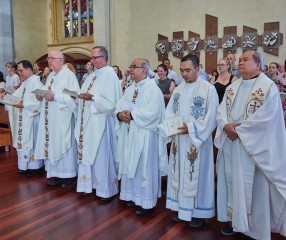 In our archdiocese we have around one hundred parishes (depending on how one counts them), some of which are very large while others are relatively small. The vast majority only have one church but there are a number, more often than not in our rural areas, where there is more than one church or Mass centre attached to the parish. Because of our understanding of the nature of the Church each of these places is properly understood to be a local Eucharistic community. At the heart of the life of each place is the celebration of Mass. This is the case even if, as happens in some of our rural settings, Mass is not able to be celebrated on every Sunday.
In our archdiocese we have around one hundred parishes (depending on how one counts them), some of which are very large while others are relatively small. The vast majority only have one church but there are a number, more often than not in our rural areas, where there is more than one church or Mass centre attached to the parish. Because of our understanding of the nature of the Church each of these places is properly understood to be a local Eucharistic community. At the heart of the life of each place is the celebration of Mass. This is the case even if, as happens in some of our rural settings, Mass is not able to be celebrated on every Sunday.
Sadly, as we know, the numbers attending Mass on a weekly basis continue to decline in many places. This is certainly a cause of concern. Primarily, however, our concern must be for our sisters and brothers who, for a variety of reasons, have “voted with their feet”, thereby distancing themselves from the very gift of the Eucharist itself. The understanding of the Eucharist which I have tried to share in this letter would indicate that this distance from the Eucharist is, in reality, a distancing from the source of life and happiness itself.
At the same time, we can rejoice in and thank God for the many parishes in our archdiocese which have faithful, committed and generous people who continue to gather together to draw strength from each other’s faith and example, to be continually inspired and challenged by the Word of God, and to be strengthened in their faith as they are drawn more deeply into communion with the Lord through Holy Communion. The Church in our archdiocese is alive and vibrant, often in ways we do not see.
One of the main responsibilities I have as the archbishop is to ensure, to the very best of my ability, that our Eucharistic communities, and most particularly our parishes, continue to thrive. Fulfilling this responsibility is a complex and demanding task. At its centre is the need to provide clergy, and most especially priests, who can be what their priestly ordination calls them to be: living signs that the Lord Jesus is still among his people as their shepherd and their servant leader. Our priests exercise this role most clearly and most fruitfully when they celebrate the Eucharist with and for their people. Their vocation then calls them to live this reality in every aspect of their daily lives among their people. This is no easy task: the Lord and the Church ask a great deal from our priests. They need our understanding and support. Thankfully our priests receive this support from many of their brother priests and people.
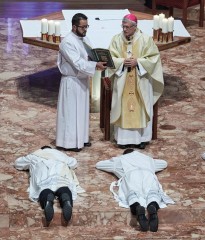 In our archdiocese our clergy, as a group, are growing older, and the number of younger priests is not at present keeping pace. Practically speaking this means that the capacity of the archdiocese to provide priests in sufficient numbers to meet our needs in the future is less certain than it was. At the moment we are fortunate to be able to have a priest in virtually every parish. However, as the COVID-19 experience has taught us, if a priest is unable to operate due to illness or some other factor, we no longer have that ready supply of “extra” priests who can step in to help. From time to time this will mean in future that on some Sundays it will not be possible to ensure that Mass is able to be celebrated in every parish and Mass centre. On such occasions it would be wise to make use of the resources from the Centre for Liturgy of the Archdiocese which offer some models for parish and other Catholic communities to use in the absence of a priest who can celebrate the Sunday Eucharist with them.
In our archdiocese our clergy, as a group, are growing older, and the number of younger priests is not at present keeping pace. Practically speaking this means that the capacity of the archdiocese to provide priests in sufficient numbers to meet our needs in the future is less certain than it was. At the moment we are fortunate to be able to have a priest in virtually every parish. However, as the COVID-19 experience has taught us, if a priest is unable to operate due to illness or some other factor, we no longer have that ready supply of “extra” priests who can step in to help. From time to time this will mean in future that on some Sundays it will not be possible to ensure that Mass is able to be celebrated in every parish and Mass centre. On such occasions it would be wise to make use of the resources from the Centre for Liturgy of the Archdiocese which offer some models for parish and other Catholic communities to use in the absence of a priest who can celebrate the Sunday Eucharist with them.
I continue to seek the advice and support of the clergy of our archdiocese as we look for appropriate responses to these difficult challenges. We have not yet reached a point of crisis but I believe it is important to share this reality with you all now before we do. Some difficult decisions may have to be made. I will do my best to ensure that they are made carefully and with appropriate consultation.
The Plenary Council – and beyond
I began this letter by recalling that the Second and final Assembly of the Plenary Council has now concluded. It has been an important moment in the life of the Church in Australia and, therefore, here in our archdiocese. We are now faced with the challenge of implementing the decisions of the Plenary Council here in the Archdiocese of Perth, once they have been confirmed by the Pope.
In line with the Plenary Council’s deliberations, and after having sought some advice, I would like to indicate that we will begin immediate planning for a Diocesan Assembly or Synod, the precise nature of which is still being discussed. Whatever form it takes it will be a formal gathering of representatives (lay, religious and clerical) of the archdiocese, the aim of which will be to propose concrete ways in which the outcomes of the Plenary Council can be studied and implemented at the local level.
It may be some time before we receive a formal response from Pope Francis. Our planning for our own Diocesan Assembly or Synod, however, does not have to wait for this response, even though the final agenda for the Diocesan Assembly or Synod will need to take it into account. We will have to wait patiently, but we will soon have the interim Acts of the Plenary Council available to us, and these will offer some very clear directions for us to begin considering. Before the end of this year, we should be in a position to establish a Coordinating Committee which can begin planning for this important event.
Concluding remarks
Thank you for taking the trouble to read this long letter. I have covered a lot of ground and raised many complex and challenging issues. I fully understand that there are many other matters which concern the Church in our archdiocese. My hope is that the proposed Diocesan Assembly or Synod might provide an opportunity for these many matters to be properly addressed. I am relying on your patience, your support and your engagement as we continue to respond as fully as we can to the will of God for the Church in our time and place.
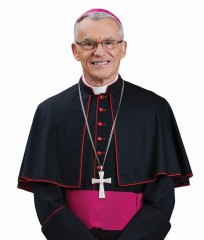 I want to conclude this letter by reminding you of the “Prayer for our Archdiocese” which I composed some years ago. It is based on the prayer for the Year of Grace, that year which invited us all to “begin afresh from Christ” and to “contemplate His face”. This is the only basis from which we can move forward with confidence and trusting faith.
I want to conclude this letter by reminding you of the “Prayer for our Archdiocese” which I composed some years ago. It is based on the prayer for the Year of Grace, that year which invited us all to “begin afresh from Christ” and to “contemplate His face”. This is the only basis from which we can move forward with confidence and trusting faith.
Yours sincerely in Christ,

+Archbishop Timothy Costelloe SDB DD
Archbishop of Perth
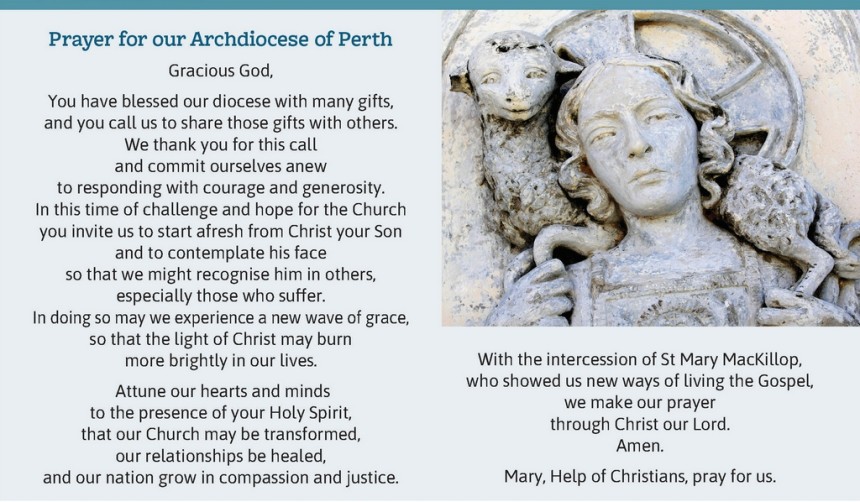
| 1. | Fifth Plenary Council of the Catholic Church in Australia (2022), Plenary Council website, plenarycouncil.catholic.org.au |
| 2. | Pope Francis (2021), Apostolic Letter Issued ‘Motu Proprio’ by the Supreme Pontiff Francis, ‘Traditionis Custodes: On the Use of the Roman Liturgy Prior to the Reform of 1970’, Holy See website, www.vatican.va/content/francesco/en/motu_proprio/documents/20210716-motu-proprio-traditionis-custodes.html |
